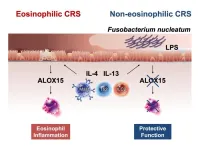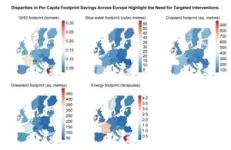(Press-News.org)
Like other countries in the world, Japan has witnessed a worrisome increase in the prevalence of chronic rhinosinusitis (CRS) over the last decade. An inflammatory disease that lasts at least 12 weeks, CRS can cause nasal congestion, nasal discharge, trouble breathing through the nose, facial pain, and even loss of sense of smell. Unfortunately, treating CRS is complex since the disease manifests in various forms. CRS can be categorized into eosinophilic (ECRS) or non-eosinophilic (non-ECRS) types. In ECRS, the nasal and sinus tissues exhibit an increased presence of eosinophils, a type of white blood cell that releases inflammatory compounds.
The increased prevalence of CRS is largely driven by environmental factors that are in turn impacted by lifestyle changes. Of the several environmental factors, microorganisms residing in the nasal cavity and passages have been known to substantially affect our health. It is however, unclear whether the nasal microbiome contributes to the development of ECRS.
To address this knowledge gap, a research team from Japan led by Assistant Professor Masanori Kidoguchi from the Faculty of Medical Science of the University of Fukui, Japan, recently conducted a study on CRS in a Japanese population with a focus on the nasal microbiome. Their paper, which was also co-authored by Professor Shigeharu Fujieda from the University of Fukui and Professor Emiko Noguchi from the University of Tsukuba, was published in The Journal of Allergy and Clinical Immunology on September 25, 2023. Dr. Kidoguchi remarks, “We undertook this study because the pathological functions of bacteria and their metabolites in the development of ECRS remain unknown.”
First, the researchers collected nasal swabs from 143 subjects, of which 65 had ECRS, 45 had non-ECRS, and 33 were healthy control subjects. They then compared the microbiome diversity between the CRS and control groups from these samples and found significant differences, suggesting that the nasal microbiome is indeed involved in (or affected by) the disease.
More importantly, the microbiome composition differed significantly between the ECRS and non-ECRS groups. Through chemical and genetic testing, the team found that the bacterium Fusobacterium nucleatum (F. nucleatum) was less abundant in patients with ECRS. Furthermore, metagenomic analyses revealed that lipopolysaccharide (LPS) synthesis was greater in patients with non-ECRS than in those with ECRS.
Based on these results, Dr. Kidoguchi speculates, “F. nucleatum is known to cause inflammation by producing LPS. Some studies suggest that LPS has varying structures and functions depending on the bacterial species. We therefore hypothesized that LPS derived from F. nucleatum might be linked to the pathogenesis of both ECRS and non-ECRS.”
To test this hypothesis, the team investigated whether LPS isolated from F. nucleatum had an effect on the expression of specific cytokines in human bronchial epithelial cell cultures. Their experiments showed that LPS derived specifically from F. nucleatum suppressed the expression of ALOX15, an enzyme that plays a key role in the formation of nasal polyps and eosinophil-related inflammation.
Taken together, the results of this study reveal that disruptions in the nasal microbiome likely play a critical role in ECRS. This finding could be leveraged to develop more effective strategies to combat this troublesome condition. “The microbiome may strongly influence treatment resistance in CRS and may have an impact on other allergic diseases as well,” comments Dr. Kidoguchi, “Future studies will hopefully lead to probiotic development and lifestyle modification methods for preventing refractory chronic sinusitis.”
Let us hope a more thorough understanding of these inflammatory conditions would pave the way for treatments and prevention strategies that will improve the quality of life of patients with ECRS.
About University of Fukui, Japan
The University of Fukui is a preeminent research institution with robust undergraduate and graduate schools focusing on education, medical and science, engineering, and global and community studies. The university conducts cutting-edge research and strives to nurture human resources capable of contributing to society on the local, national, and global level.
Website: https://www.u-fukui.ac.jp/eng/
About Assistant Professor Masanori Kidoguchi from University of Fukui, Japan
Dr. Masanori Kidoguchi is an Assistant Professor of the Otorhinolaryngology, Head, and Neck Surgery Division at the University of Fukui. He obtained his Ph.D. in 2020 from the University of Fukui and has multiple research publications to his credit, with a special interest in otorhinolaryngology, immunology, allergy, and genomics.
Funding information
This study was funded by grants from the Japan Society for the Promotion of Science (KAKENHI grant no. 17H04344, 20K22998, 21H03086, and 21K16827), the Health Labour Sciences Research Grants program (grant no. H30-Nanchitou (nan)-Ippan-016), the Japan Agency for Medical Research and Development (grant no. JP22ek0410077h), and MSD Life Science Foundation, Public Interest Foundation (grant no. RA-017).
Media contact:
Naoki Tsukamoto
University of Fukui PR center
sskoho-k@ad.u-fukui.ac.jp
END
Research Highlights:
American Indian and Alaska Native adults had significantly higher death rates from premature heart attacks compared to white, Black and Asian/Pacific Islander adults in the U.S., according to an analysis of more than 370,000 heart attack deaths from 1999-2020.
In addition, despite an overall decrease in heart attack death rates among American Indian and Alaska Native adults during the last two decades, heart attack-related deaths in American Indian and Alaska Native adult men younger than 55 years old and women younger than 65 years old did not decrease.
Embargoed until 4 a.m. CT/5 a.m. ...
Research Highlights:
A child’s race, ethnicity and/or the neighborhood where they live may have an impact on their survival and recovery after a cardiac arrest.
Black children were more than four times more likely to experience a cardiac arrest compared to white or Hispanic children.
Children from neighborhoods with the highest socioeconomic status had the best odds of surviving and functioning well after a cardiac arrest.
Embargoed until 4 a.m. CT/5 a.m. ET, Monday, Nov. 6, 2023
DALLAS, Nov. 6, 2023 — Children’s ...
Research Highlights:
As more people across the U.S. use marijuana for medical and recreational reasons, two new studies suggest its regular intake may damage heart and brain health.
In one study, daily use of marijuana raised the risk of developing heart failure by about one-third, even after considering other factors, compared to people who reported never using marijuana.
In a second study, older people with any combination of Type 2 diabetes, high blood pressure and high cholesterol who used marijuana, ...
Research Highlights:
In a small study of adults living in rural America, those who identified as transgender were more likely to have cardiovascular disease risk factors, including tobacco use, obesity, high blood pressure, Type 2 diabetes or insulin resistance, high cholesterol and/or alcohol use.
Study participants with the highest odds of having cardiovascular disease risk factors were transgender males.
The findings highlight the need for interventions focused on reducing health disparities among the transgender population, researchers said.
Embargoed until 4 a.m. CT/5 a.m. ET, Monday, Nov. 6, 2023
DALLAS, Nov. 6, 2023 — Transgender ...
Research Highlights:
An experimental, leadless pacemaker housing is able to partially recharge the device’s battery by generating electrical energy from heartbeats.
The device generated about 10% of the energy needed to stimulate another heartbeat.
The preliminary findings show that leadless pacemaker batteries may be recharged by converting the heart’s mechanical/pressure energy into electrical energy, however, more research is needed.
Embargoed until 4 a.m. CT/5 a.m. ET, Monday, Nov. 6, 2023
DALLAS, ...
Research Highlights:
High blood pressure risk was higher among adolescent girls with a condition associated with irregular menstrual periods called polycystic ovary syndrome, compared to teens without this condition, according to a study of girls between 13-17 years of age.
In a separate study of women younger than age 50, those with painful menstrual periods had a notably higher risk of heart disease compared with those women without the condition known as dysmenorrhea.
Researchers of both studies suggest future investigations focus on how these reproductive conditions may impact women’s long-term cardiovascular disease risk.
Embargoed until 4 a.m. CT/5 a.m. ET, Monday, Nov. ...
Research Highlights:
Artificial intelligence (AI) and deep learning models may help to predict the risk of cardiovascular disease events and detect heart valvular disease, according to two preliminary research studies.
One study found that artificial intelligence analyzing sound data of the heart recorded from a digital stethoscope was able to more accurately detect heart valve disease than a health care professional who listened to the heart with a traditional stethoscope.
In a study evaluating data from the UK Biobank, an artificial intelligence/deep learning program effectively analyzed and sorted eye images ...
Research Highlights:
Depression and anxiety may accelerate the onset of risk factors for increased heart attack and stroke, according to a Boston-based study. People with a higher genetic sensitivity to stress developed a cardiovascular risk factor at a younger age, than people without the genetic marker.
A separate study based in Dallas found that cumulative stress contributed to health behaviors — such as smoking — that negatively affect cardiovascular health and potentially increasing plaque buildup in the arteries and other known cardiovascular disease risk factors.
Embargoed until 4 a.m. ...
DURHAM, NC -- A speech prosthetic developed by a collaborative team of Duke neuroscientists, neurosurgeons, and engineers can translate a person’s brain signals into what they’re trying to say.
Appearing Nov. 6 in the journal Nature Communications, the new technology might one day help people unable to talk due to neurological disorders regain the ability to communicate through a brain-computer interface.
“There are many patients who suffer from debilitating motor disorders, like ALS (amyotrophic lateral sclerosis) or locked-in syndrome, that can impair their ability to speak,” said Gregory Cogan, Ph.D., a professor of ...
LA JOLLA (November 6, 2023)—Regulatory T cells are specialized immune cells that suppress the immune response and prevent the body from attacking its own cells. Understanding how these cells work is key to determining how they might be manipulated to encourage the destruction of cancer cells or prevent autoimmunity. Cell behavior is influenced by chromatin architecture (the 3D shape of chromosomes) and which genes are accessible to proteins—like Foxp3, which promotes regulatory T cell development.
Now, Salk Professor Ye Zheng and Assistant Professor Jesse ...




